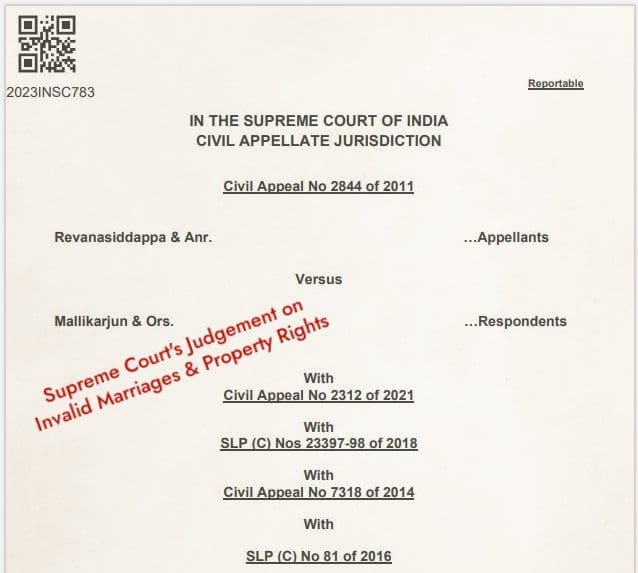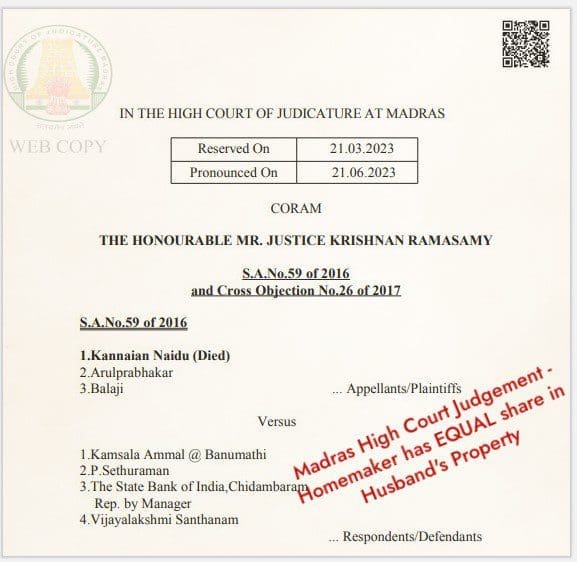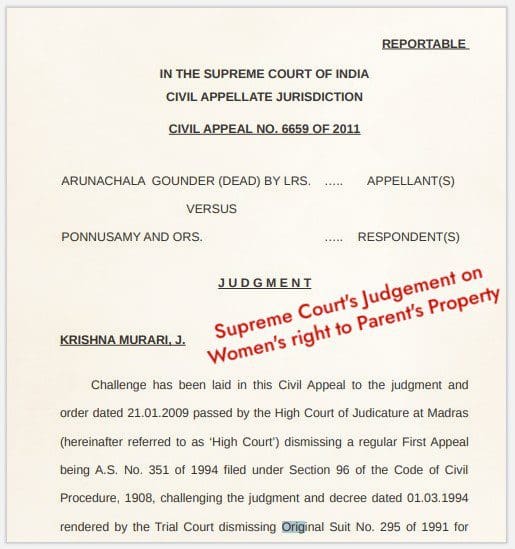In the recent past, the Supreme Court has been regularly taking a gender-neutral stance on division of property ownership rights between daughters and sons. The judiciary is steadily working to make the ‘succession law’ more accommodating to women.
The Supreme Court and some Hight Courts have recently given some landmark judgments on Women’s Property Rights. These judgements give us valuable insights on;
- Whether children from invalid marriages can inherit ancestral property.
- If a Homemaker (Wife) has equal share in Husband’s property
- Property rights of daughters and daughters-in-law in India (Women’s right to Parent’s Property.)
Latest Court Judgements on Women’s Property Rights
Let’s go through the important points of these landmark judgements..
Children from invalid marriages can inherit Ancestral Property too

- The latest judgement deals with the inheritance rights of children from void or voidable marriages.
- The Supreme Court on August 18 2023, reserved its judgment on whether children born out of invalid, void and voidable Hindu marriages can inherit their parents’ ancestral property.
- The SC has opined that the birth of a child born out of an illegitimate relationship has to be viewed independently of the relationship of the parents. A child born in such a relationship is innocent and is entitled to all the rights which are given to other children born in valid marriage.
- The Court had held that such children would have a right to any property that belonged to their parents, whether they were self-acquired or ancestral property.
- The court had however clarified that the children’s claims would be limited to the property of their parents and not of other relatives. And such children cannot ask for partition before the death of their parents.
- The top court has made it clear that its verdict would be applicable only to properties governed by the Hindu Mitakshara law, under which the son, grandson and great grandson have a right to the family property through birth.
Homemaker (Wife) has equal share in Husband’s property

- In one of the domestic dispute cases, the Madras High Court has passed a verdict that allowed a housewife equal share in her husband’s property.
- As per the legal experts, this is the first time an Indian court has formally recognized the contribution of a homemaker to the husband’s income.
- The HC is of the view that the contribution made by either the husband by earning (or) the wife by serving and looking after the family and children, would mean that “both are entitled equally to whatever they earned by their joint effort”.
- The court held that such contributions should be considered while determining the property rights, regardless of whether the properties were acquired in the wife’s name. The court noted that the husband’s financial contributions alone did not entitle him to exclusive ownership, as the wife’s invaluable services as a homemaker reduced the family’s expenses and facilitated savings.
- Another important view expressed by the Hight Court is – If the homemaker (wife) buys a property by pledging or selling her gold jewelry that she got at the time of her marriage then she will be the sole owner of such property under the Hindu law. (Related article: What is Streedhan?)
- Kindly note that the Madras HC verdict is not binding on other states, unless the country’s Supreme Court rules along similar lines in future.
“The woman’s domestic labour contributes indirectly to earning the money that enables the purchase of the assets and that her work allows the husband to be gainfully employed.”
“The bench noted that in the generality of marriages, the wife bears and rears children and minds the home. She thereby frees her husband from his economic activities. As she facilitates her husband’s ability to fulfill his duties, it is only fair that she receives a portion of the benefits.“
– The Madras High Court
Property rights of daughters and daughters-in-law in India

- The Supreme Court has already clarified (in 2020) that daughters will have equal coparcenary (joint heirship) rights in joint Hindu family property even if the father died before the Hindu Succession (Amendment) Act, 2005. Since the right in coparcenary is by birth, it is not necessary that father coparcener should be living as on September 9, 2005. This judgement was on daughter’s’ right in an ancestral property.
- Now, in one of its latest judgments, the SC conferred daughters with equal right to father’s property even prior to codification of Hindu personal laws and enactment of the Hindu Succession Act 1956 and the law of inheritance would apply to partition of Propeties even if the father died intestate (without a WILL).
- What does this mean? – Upon the death of the father intestate, his daughter(s) will inherit the property (self-acquired or ancestral) by inheritance and shall not be based on survivorship.
- The SC has further stated that if the daughter dies while her father is alive, her children can claim their mother’s share of grandfather’s ancestral property. In the case of the father’s self-acquired property, the father decides to give the property to whoever he wants out of his free will. However, if the father dies without writing a Will, his property will be equally divided among the legal heirs, which include daughters too.
- In case a female Hindu dies interstate, the property inherited by her from her father or mother would go to the heirs of her father. However, the properties inherited by her from her husband or father-in-law would go the heirs of her husband.
- Do note that for the daughters-in-law, the property share is only through the husband, and she does not hold any legal right on the self-acquired property by in-laws.
“Suppose a Hindu makes a Will or makes a disposition of property in favour of the son according to The Hindu Succession Act, 1956 and not the daughter, then the daughter will not be able to question the Will and not claim the benefit of the Supreme Court Judgment. “
There is no doubt that these are landmark judgements. But these enactments along with the change in the mindset of the society at large, both are essential in the forward march of women’s rights.
Continue reading:
(Post first published on : 2-Sep-2023)


